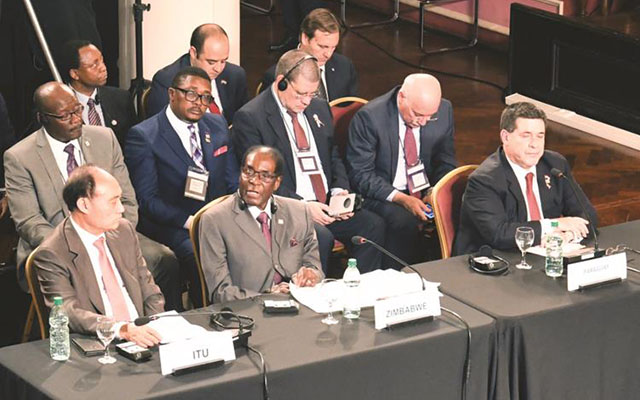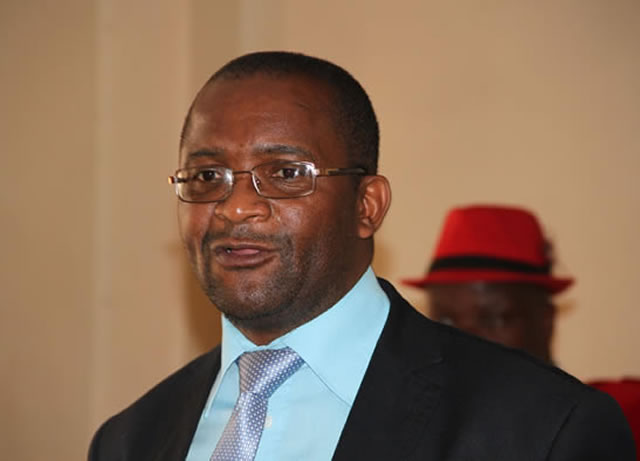Govt in drive to contain NCDs •Inter-ministerial task force on cards: President •National policy framework in place


President Mugabe addresses a plenary session of the World Health Organisation Global Conference on Non-Communicable Diseases in Montevideo, Uruguay, yesterday. In attendance were Foreign Affairs Minister Dr Walter Mzembi and Health and Child Care Minister Dr David Parirenyatwa. — (Picture by Presidential Photographer Joseph Nyadzayo)
Takunda Maodza in MONTEVIDEO, Uruguay—
Government is making efforts to establish an Inter-Ministerial Task Force on Non-Communicable Diseases (NCDs) because such diseases need a multi-sectoral response, President Mugabe has said. NCDs are chronic diseases that cannot be passed from person-to-person and include cancer, diabetes, chronic respiratory and cardiovascular diseases.
Read More……….
- Dialysis too expensive, says Parirenyatwa
- Cancer cases on the rise
- Healthcare can spur economic growth: Cimas
- Hypertension: The silent killer spreading across Africa
- EDITORIAL COMMENT: Time for Africa to fund own health systems
- ‘Universal health coverage possible’
- Africa adopts six health frameworks
- NAC to launch cancer awareness programme
- President leaves for Uruguay
- President in Uruguay for WHO meeting
Addressing the World Health Organisation Global Conference on NCDs, which was officially opened by Uruguayan President Tabare Vasquez yesterday, President Mugabe, who arrived here on Tuesday, said Zimbabwe had adopted several strategies to combat challenges posed by new health outbreaks, including NCDs. He said the country, through the Ministry of Health and Child Care, had also developed a national NCDs policy.
“Efforts are also underway to establish an inter-Ministerial Task Force on Non-Communicable Diseases through the Ministry of Health and Child Care. This initiative comes from our awareness that non-communicable diseases need a multi-sectoral response, and comes on the back of our highly-acclaimed Aids Levy. We have established Health Levy Fund, an innovative financing mechanism to raise resources for the procurement of medicines, supplies and equipment for the management of non-communicable diseases, among other conditions. This fund is derived from a five percent surcharge of mobile communications usage,” he said.
“In the case of non-communicable diseases, Zimbabwe has adopted a National Health Strategy spanning from 2016-2020, which we have dubbed ‘Equity and Quality in Health: Leaving No One Behind’. The strategy provides the framework that guides the efforts of our Ministry of Health and Child Care and all stakeholders in contributing to the attainment of the SDG3 (Sustainable Development Goal)”. President Mugabe said Zimbabwe had a policy on NCDs.
“Zimbabwe has also developed a national non-communicable diseases policy, a palliative care policy, and has engaged United Nations agencies working in the country, to assist in the development of a Cervical Cancer Prevention and Control strategy to cover the period 2016 to 2020.” President Mugabe said like all developing countries, Zimbabwe was harmstrung by the lack of adequate resources for executing programmes aimed at reducing NCDs and other health conditions afflicting the people.
“My Government thus remains committed to work closely with the World Health Organisation, the private sector and the donor community, in efforts to mobilise resources for programmes aimed at reducing non-communicable diseases,” he said. President Mugabe expressed gratitude for Zimbabwe’s election as the chair of the 71st World Health Assembly from 2018 to 2019. The country was elected two months ago in Victoria Falls at the WHO Afro-regional meeting.
“It is an honour we receive with great humility, mindful of the responsibilities which it carries. We are all committed to address the global non-communicable diseases, which threaten the achievement of the Sustainable Development Goals,” he said. NCDs are primarily linked to common risk factors like harmful use of alcohol, unhealthy diet and physical inactivity. This means changing lifestyles and adoption of a regimen of exercise can help prevent NCDs. President Mugabe said developing countries were struggling to move from commitment to action because of resource constraints and lack technical capacity. This has been worsened by global economic challenges facing fragile economies negatively impacting on national health systems.
“Against this inauspicious backdrop, the importance of strong national health systems and interventions cannot be overemphasised. And these are predicated and should underline the need to strengthen health systems, health care infrastructure, human resources for health and social protection systems, particularly in developing countries,” said President Mugabe.
He said in the fight against NCDs, the onus must fall on all parties – principally governments, all development partners, civil society and communities. President Mugabe acknowledged the leading role played by WHO as the primary specialised agency on health matters.
“Through it, international cooperation must be marshalled in support of national, regional and global plans for the prevention and control of non-communicable diseases. This should be done through the exchange of best practices in the areas of health promotion, legislation, regulation, strengthening of health systems, training of health-care personnel and the development of appropriate health-care infrastructure and diagnostics,” said President Mugabe.










Comments